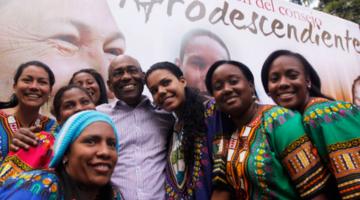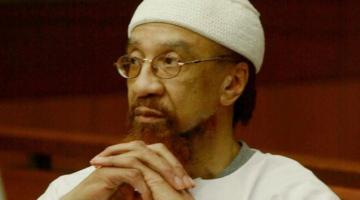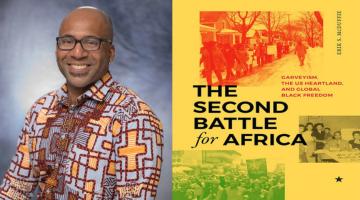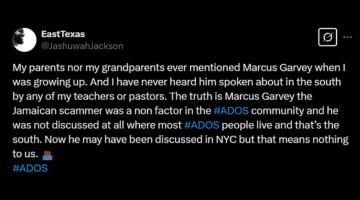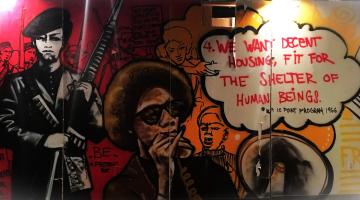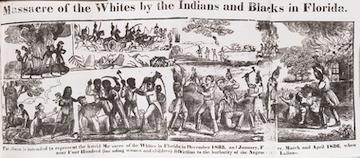Black Panther Party march.
The end of the Second Imperialist War (World War II) did not usher in the end of colonialism and oppression for Africans on the continent and in the diaspora. The resistance of Pan-African movements grew in political strength and numbers, resulting in increased repression during the anti-communist hysteria of McCarthyism.
Originally published in Fighting Words.
When the Red Army seized control of Berlin in early May 1945 hoisting the Soviet flag on the Reichstag building within the besieged city, jubilations erupted across Europe and around the world.
The European phase of the Second Imperialist War cost the lives of tens of millions of people in the fight against fascism.
In the North African state of Algeria thousands of people went into the streets on May 8, 1945 celebrating the defeat of the German military while at the same time demanding an immediate end to French colonialism. Instead of joining in with the people of Algeria, a country which had been subjected to imperialist rule since 1830, the French police and military opened fire killing thousands in one of the largest massacres of the colonial period.
Details related to this horrendous act of repression ordered by the French military and government were suppressed and then denied by the officials in Paris. Algeria, as a result of the German occupation of France after 1940, had become the de facto capital of the European state.
One account of the massacre emphasizes that:
“Panic ensued and clashes between the Algerians and French quickly led to violence with the French using all attempts to control the population. The colonial forces launched an air and ground offensive against several eastern cities, particularly in Setif and Guelma. The head of the temporary government of France at the time, General De Gaulle, ordered for farmers and villagers from surrounding areas to be killed in what quickly became lynching operations and summary executions. Thousands of bodies accumulated so quickly that burying them was impossible, so they were often dumped in wells or surrounding ravines. The violence would continue until 22 May when the tribes surrendered. By then, 45,000 Algerian men, women and children in and around the region of Setif, Guelma and Kherrata had been killed along with 102 French casualties.”
The May 8 massacre and subsequent events in Algeria fueled nationalist sentiment which eventually created the conditions for the initiation of an armed struggle nine years later in November 1954. The war of liberation lasted until 1962 when the French imperialists were forced to grant independence to Algeria after 132 years of occupation.
These events in Algeria during the post-war period were by no means isolated incidents. The following year, beginning on August 12, 1946, thousands of African miners struck in the Union of South Africa. The strike was led by J.B. Marks of the Communist Party and the African National Congress (ANC).
The mine bosses and police responded to the strike with brute force. At least 9 miners were killed and more than 1,200 were wounded and injured. Although the strike was ruthlessly suppressed, the degree of militancy exemplified by the African Miners Union would have an impact on the overall struggle for national liberation led by the ANC and its allies during the subsequent years during the 1950s.
In the Gold Coast, later known as Ghana, the African military veterans were angered over the failure of the British colonial forces to pay benefits for their service during the Second Imperialist War. On February 28, 1948, during a demonstration by the ex-servicemen in the capital Accra, the British security forces opened fire on the march killing three people. In response, strikes and rebellions erupted throughout various regions of the country.
According to one account of these developments:
“The people’s protests lasted five days. By 1st March the colonial governor had declared a state of emergency and put in place a new Riot Act. On 12th March the governor ordered the arrest of ‘The Big Six,’ leading members of the UGCC, which included Kwame Nkrumah, as he believed they were responsible for orchestrating the disturbances. The Big Six were incarcerated in remote northern parts of the country. It was around this time that Nkrumah and the other five began to have significant disagreements over the direction of the movement for independence. By 1949 Nkrumah had broken away from the UGCC to form the Convention People’s Party (CPP) taking the masses of the people with him. The CPP, through a campaign of ‘Positive Action,’ achieved an end to the Gold Coast colony and brought the new dawn of independent Ghana on 6th March 1957.”
Impact of the Cold War on the African American Struggle
These events in Africa had a tremendous impact on people of African descent in the U.S. Even prior to the Rand Miners’ strike of 1946, the Council on African Affairs (CAA) led by Dr. William A. Hunton, Paul Robeson and others held a solidarity rally with the South African movement at Madison Square Garden in New York City on June 6, mobilizing tens of thousands. The CAA was founded in 1937 by Robeson, Hunton, Max Yergen and many others.
However, after the conclusion of World War II, the CAA would come under fire by the U.S. government which labeled the organization as a “communist front.” Similar attacks were also carried out against the Civil Rights Congress (CRC) since both organizations were supported by the Communist Party.
Robeson, Du Bois and his wife, Shirley Graham Du Bois, were targeted for their support of the socialist states and national liberation movements in Africa. After they attended the Paris Peace Conference of 1949 their passports were confiscated, and Du Bois was later charged with being an “agent of a foreign power” due to his opposition to the Cold War which threatened the commencement of another global conflagration this time involving the socialist states and U.S. imperialism.
Although the case against W.E.B. Du Bois collapsed, many others were indicted between 1948 and 1951 on numerous charges including failure to register as a foreign agent and conspiring to overthrow the U.S. government. The Smith Act, which outlawed the advocacy of the violent overthrow of the government, was utilized in the indictments and prosecutions of more than 100 members of the Communist Party. Lawyers who provided legal assistance to the defendants were held by the judge in contempt of court and faced disbarment and jail sentences.
The Cold War and the Mass Civil Rights Movement
In May 1954, the U.S. Supreme Court handed down its Brown v. Topeka ruling which declared that the “separate but equal” decision in the Plessy v. Ferguson case of 1896 was inherently unconstitutional. The following year the lynching of 14-year-old Emmett Till in Mississippi and the quest for justice in the case by his mother, Mamie Till Mosby created an atmosphere of discontent among the African American people.
Although the Mississippi courts refused to convict the two murderers of Till, by December of 1955, the Montgomery Bus Boycott erupted sparked by the arrest of Mrs. Rosa L. Parks of the NAACP who had worked closely with E.D. Nixon, an organizer for the Brotherhood of Sleeping Car Porters. Dr. Martin Luther King, Jr., a Baptist minister in Montgomery, became the spokesperson for the movement.
After the successful conclusion of the Montgomery Bus Boycott in 1956 when the Supreme Court ruled against segregation in the municipal transportation service, King and his comrades founded the Southern Christian Leadership Conference in 1957. Although a Civil Rights Bill was passed by the U.S. Congress in 1957 aimed at strengthening the capacity of the Justice Department to enforce the right to vote among African Americans, progress remained extremely slow for the remainder of the decade.
However, by 1960, student demonstrations erupted across the South against legalized segregation involving public accommodations and private businesses. During April, the Student Nonviolent Coordinating Committee (SNCC) was formed at an SCLC sponsored conference held at Shaw University in Raleigh, North Carolina. Ella Baker, who had served as the executive secretary of SCLC, encouraged the students to form their own independent organization.
SNCC moved throughout various areas of the South to organize local communities and students to advance the struggle against segregation and later for voting rights. The Mississippi Summer Project of 1964 brought together numerous Civil Rights groups in the state where they engaged in voter registration and the formation of the Freedom Democratic Party (MFDP).
Other important developments in 1964 would prove highly significant. Malcolm X broke with the Nation of Islam forming the Organization of Afro-American Unity (OAAU) on June 28 after a tour of the African continent and several countries in West Asia. Malcolm’s emphasis on armed self-defense, Black Nationalism and Pan-Africanism had a monumental influence on SNCC and other young people.
By 1966, when Stokely Carmichael, later known as Kwame Ture, became SNCC chairman, Black-led urban rebellions had increased in their frequency across the U.S. It was the work of SNCC in Lowndes County, Alabama in 1965-66 which led to the creation of the original Black Panther Party. The Black Panther concept rapidly spread to other regions of the U.S. In October 1966, the Black Panther Party for Self-Defense was founded in Oakland, California under the leadership of Huey P. Newton and Bobby Seale.
The Federal Bureau of Investigation and the U.S. Congress continued their repressive campaigns against the leadership of social movements under the guise of fighting communism and subversion. Many people were killed during the more than 200 urban rebellions which took place between 1964 and 1970. More than twenty members of the Black Panther Party were murdered by police and those operating in their interest. Hundreds of Panthers and members of other revolutionary organizations were framed on trump-up charges and sent to jails and prisons.
Therefore, the attempted suppression of national liberation movements in Africa coincided with the efforts to overthrow the socialist countries while simultaneously targeting Black-led social movements in the U.S. These developments further exposed the falsehood that the U.S. political system was based upon democratic practice and the right to due process.
Abayomi Azikiwe is the Editor of Pan-African News Wire.

